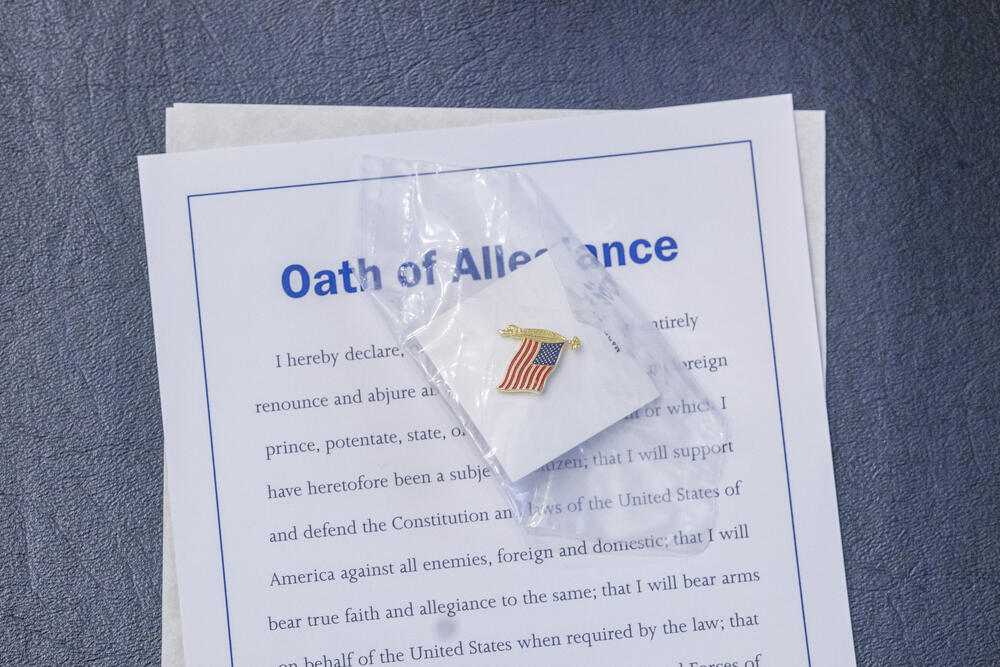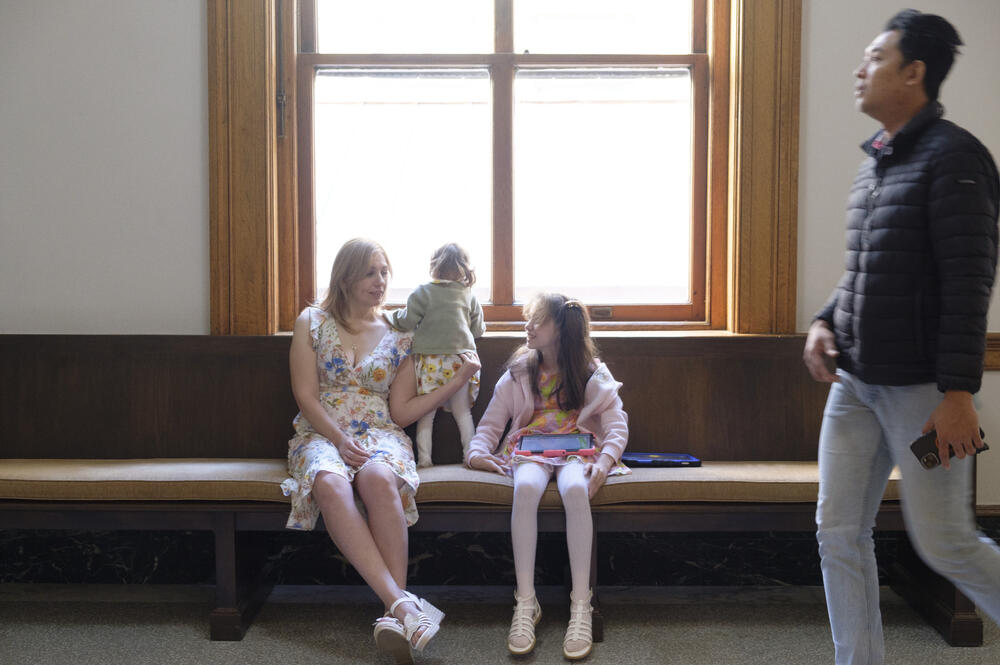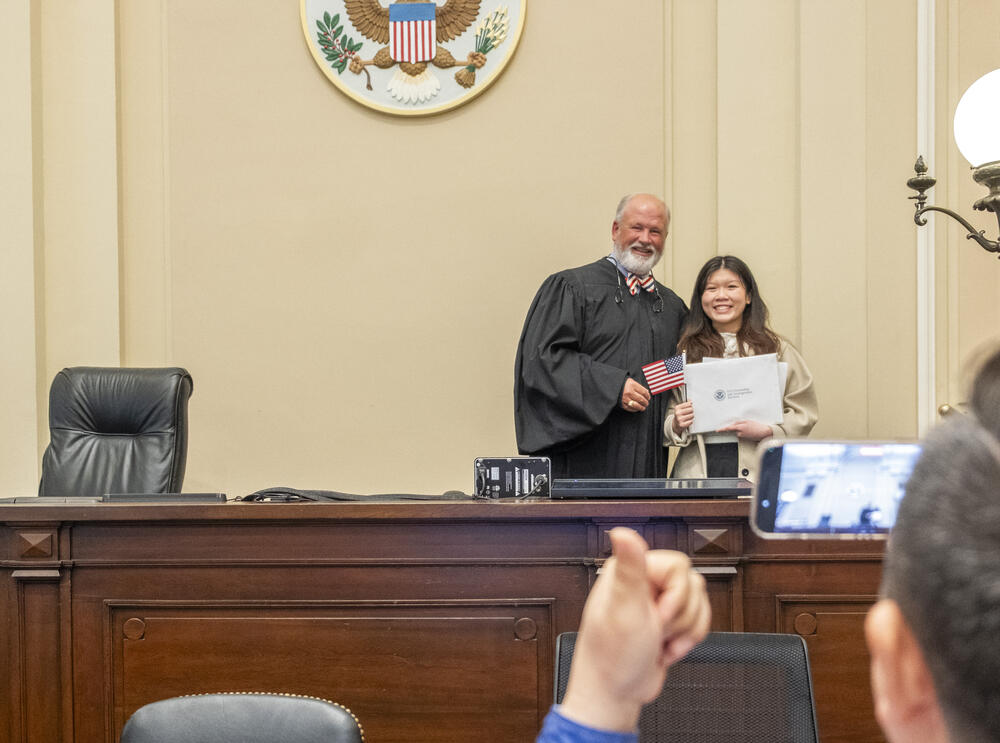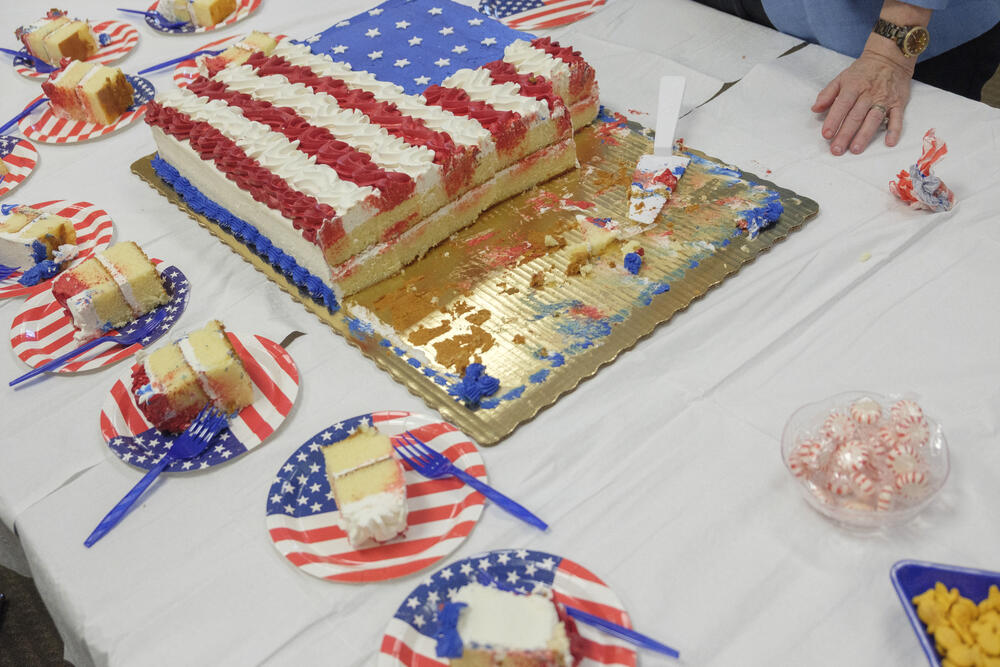
Caption
Every participant received a paper copy of the Oath of Allegiance and, as a memento, a small enameled pin of an American flag.
Credit: Grant Blankenship/GPB News
|Updated: April 15, 2025 11:58 AM
By now, you probably know the road from immigrant to citizen can be long and arduous, regardless of what the first step on that road looked like for the person who eventually raises their hand to take the Oath of Allegiance to the United States.
Wednesday in Macon, 22 people from 15 different countries stepped off that road and into the full rights of U.S. citizenship in a ceremony at the Bootle Federal Courthouse in Macon.
They were college students, engineers, mothers, fathers and even an entomologist.

Every participant received a paper copy of the Oath of Allegiance and, as a memento, a small enameled pin of an American flag.
For Elizabeth Mendoza, the day also marked the anniversary of her relationship with her boyfriend.
"I got to the States back in 2005, so it's been 20 years," she said. "It took a long time to get to this point."
When she came here from El Salvador, she was just 17.
"People didn't have any job opportunities, and plus gang members or gangsters over there were horrible," Mendoza said. "A lot of young boys were getting killed. Everywhere. It was like an everyday thing. So it was a sacrifice in order for us to have a better future.”
Mendoza's parents packed her off with her younger brother — but without them — to escape the violence. She knew no English, nothing of American culture. Ten years in, she got what she called her first big opportunity: permission to work.
“Back in 2015, I got my first work permit and since then, I've been doing everything in order to get to this point.”
The work permit led to a green card, which led to this day. But as she watches her community today, does she think the journey she undertook 20 years ago is even possible now?
“It is possible, a little bit more difficult, I would say — but I believe that everybody will get the chance that they deserve,” Mendoza said.

Flavia Mollica waits with two of her children outside the courtroom where she would finally become a naturalized U.S. citizen Wednesday. “I’m very happy, I'm proud that I'll be American and I love this country,” she said. “USA is a great country, it’s a big country, and I want to be part of that. I want be part of the history.”
Like Mendoza, Ze (they only gave a first name) came to the U.S. as a child. They've only been here a fraction of the time Mendoza has, but they are at home.
“Frankly, I have told a lot of my friends this, I'm more American than I would expect to be for someone to be here for only seven years,” Ze said before thinking it over.
“Eight now, actually. Yeah, it's almost eight years.”
Ze arrived in the U.S. in time for freshman year of high school
“It was tough, it was very tough at first because I didn't speak much English back then.”
And Ze said the school system wouldn’t help.
“The school knew I'm literally foreign and decided to not do anything about it,” Ze said. “So I struggled through my entire freshman year of high school.”
Ze's options were: Sink or swim. They chose to swim, in waters which, despite the obvious challenges, they say they could never have enjoyed in China.
"When I was in China, the pressure's quite high academically, and just in general, living was quite hard, because it's very competitive," Ze said.
In the U.S., Ze has felt free to explore.
"I transferred to three schools, just because I feel like I want to try different things to figure out what I can do."

Cindy Ngo, a civil engineering student at the University of Georgia, poses with federal judge Tillman Self III after Self presided over the naturalization ceremony for Ngo and 21 others in Macon.
Now Ze is studying at the University of Georgia. So is Cindy Ngo. Like Elizabeth Mendoza and Ze, Ngo's story is one of parents risking it all for a better life for their kids.
"As my parents say, they gave up their whole career, family and parents to get into here, to get us, their children, a better future," Ngo said
While both Cindy Ngo and Ze have their futures at UGA secured, at least from an immigration standpoint, university newpspaper The Red and Black reports that "a small number" of international students recently had their visas revoked.
Ngo is the last in her nuclear family to become naturalized. For her, the process has been a little delayed.
"I was supposed to get my citizenship before the voting process of last year started," Ngo said.
She said she found it very frustrating to listen to all her friends debate who they would cast their vote for in the presidential election.
"They all shared their political standpoint. I was just like, 'Damn, I can't do anything at all.'"
Even when her day finally came, she missed out on the satisfaction of receiving her official certificate of citizenship, with her legal name and photo, the way nearly everyone else did. But she was assured by the official from Homeland Security that the paper was a formality. She had, indeed, finished the naturalization process.
And so now Cindy Ngo, studying civil engineering, is looking forward to the first time she gets to exercise the right to vote.
"Absolutely; I care about how the government is going to contribute to us," she said. "Because there's a lot of news that's going crazy right now."
A lot of that news is focused on immigration, and narrowing the path by which people come to the United States can eventually make it their home or even who gets to call themselves an American.

As has been their tradition for years, local members of the Daughters of the American Revolution served cake and punch to newly naturalized U.S. citizens at the federal courthouse in Macon on Wednesday, April 9, 2025.
In closing his remarks to the handful of new citizens arrayed before him from the bench, in the ornate main courtroom of the courthouse named after the judge whose decision racially integrated the University of Georgia, Judge Tillman Self III said there is no such thing as a second-class citizen.
"Today, America is more than your home — it's your country," Self said. "And it's just as much your country as it is mine, or the country of anyone who can trace their ancestry back to our founding fathers."
And, he added, if you hear someone suggest otherwise, know that in the list of rights they have as an American is the right to that belief.
"But they're just wrong," Self said. "Just wrong."
And with that, the judge welcomed 22 Americans home.